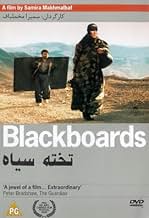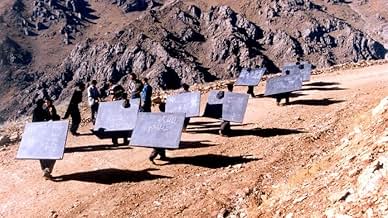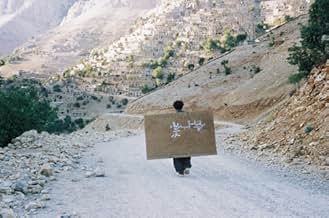Ajouter une intrigue dans votre langueKurdish teachers Said and Reeboir roam Iranian villages near Iraqi border during war. Said guides displaced men, marries widow Halaleh. Reeboir joins child smugglers. Amid danger, they try t... Tout lireKurdish teachers Said and Reeboir roam Iranian villages near Iraqi border during war. Said guides displaced men, marries widow Halaleh. Reeboir joins child smugglers. Amid danger, they try teaching nomadic students while soldiers patrol.Kurdish teachers Said and Reeboir roam Iranian villages near Iraqi border during war. Said guides displaced men, marries widow Halaleh. Reeboir joins child smugglers. Amid danger, they try teaching nomadic students while soldiers patrol.
- Director
- Writers
- Stars
- Prix
- 3 victoires et 3 nominations au total
Avis en vedette
This is a rather well made movie, that shows some of the problems in Iran that affects its poor northern citizens, without luckily ever getting over-dramatic or too sentimental but at the same time it's also lacking in true depth to make this a powerful or impressive movie.
It's a slow moving movie that is entirely filmed with handhold camera, with lots of long sequences. It works good for a realism and the atmosphere of the whole movie but at the same time means that this is not a movie for just everyone. You must be able to handle the slow- and different way of storytelling to appreciate this movie fully.
The movie is good looking, with its moody, never-ending, landscapes and good camera positions to tell the story with. The dialog is realistic, though not always interesting. I mean they basically say the same things five times in a row in this movie, which perhaps is a bit irritating. This is also due to the non-professional actors that play in this movie. Needless to say that not everything works out fully in this movie, especially when it comes down to the true emotion or depth of the movie. Lucklily there is no lack of realism, although the movie its story pushes it at times. But on the other hand it's the story that still makes this a pleasant movie to watch. The subject might be heavy and serious but luckily the movie doesn't try to emphasis this. The end result is a good and not heavy to watch movie that is absolutely worth seeing but lacking in real emotions or depth to make a true lasting impression.
The movie is told from an original point of view; A couple of schoolteachers that travel trough the North of the country to remote villages and groups of refugees, to teach them the basic things such as writing, reading and simple math, to try and give everyone a better future and at the same time earn some money or get some free food as well. They're mixed up in all the difficulties but yet they're no part of it. If they want they can walk away from all the troubles if they choose to. They're objective in the whole situation and they don't do more than is ever asked of them.
Most of the characters in this movie are being played by non-actors. It works realistic but at the same time is one of the reasons why the movie is lacking in any true depth or well acted out emotions. The movie as a whole is effective and it makes its point well but it does so without ever impressing too much, with the exception of one or two great sequences.
Samira Makhmalbaf has some good and promising potential as a filmmaker and is possible future Oscar potential, just like her father, who also co-wrote this movie but her movies have to become even more confronting and daring if she wants to achieve that.
7/10
http://bobafett1138.blogspot.com/
It's a slow moving movie that is entirely filmed with handhold camera, with lots of long sequences. It works good for a realism and the atmosphere of the whole movie but at the same time means that this is not a movie for just everyone. You must be able to handle the slow- and different way of storytelling to appreciate this movie fully.
The movie is good looking, with its moody, never-ending, landscapes and good camera positions to tell the story with. The dialog is realistic, though not always interesting. I mean they basically say the same things five times in a row in this movie, which perhaps is a bit irritating. This is also due to the non-professional actors that play in this movie. Needless to say that not everything works out fully in this movie, especially when it comes down to the true emotion or depth of the movie. Lucklily there is no lack of realism, although the movie its story pushes it at times. But on the other hand it's the story that still makes this a pleasant movie to watch. The subject might be heavy and serious but luckily the movie doesn't try to emphasis this. The end result is a good and not heavy to watch movie that is absolutely worth seeing but lacking in real emotions or depth to make a true lasting impression.
The movie is told from an original point of view; A couple of schoolteachers that travel trough the North of the country to remote villages and groups of refugees, to teach them the basic things such as writing, reading and simple math, to try and give everyone a better future and at the same time earn some money or get some free food as well. They're mixed up in all the difficulties but yet they're no part of it. If they want they can walk away from all the troubles if they choose to. They're objective in the whole situation and they don't do more than is ever asked of them.
Most of the characters in this movie are being played by non-actors. It works realistic but at the same time is one of the reasons why the movie is lacking in any true depth or well acted out emotions. The movie as a whole is effective and it makes its point well but it does so without ever impressing too much, with the exception of one or two great sequences.
Samira Makhmalbaf has some good and promising potential as a filmmaker and is possible future Oscar potential, just like her father, who also co-wrote this movie but her movies have to become even more confronting and daring if she wants to achieve that.
7/10
http://bobafett1138.blogspot.com/
I have nothing against slow movies -- for instance kiarostami is a huge favorite of mine. But I have to admit, this film really pushes the slow-and-obtuse envelope. it's mainly the script. the teachers encounter various nomads and desperately harangue them to hire them as teachers... when people refuse, they just repeat themselves again and again, and it seems that nobody really listens to anyone else. it's a study in harshness. it leans heavily on symbolism, and you feel that the whole thing is totally constructed by the filmmaker, that no respect at all is being paid to naturalism or the kinds of reactions that people would likely have in a situation like this. so, if you're really excited by a symbol-filled, quite stark time, you will appreciate this. I wasn't up for it.
10Red-125
This wonderful movie (shown here as "Blackboards") demonstrates the power of cinema to communicate circumstances and situations that are totally alien to those of us watching in comfort during a U.S. film festival.
The Director/Screenwriter, Samira Makhmalbaf, literally learned her trade at her father's elbow. He taught her well. Makhmalbaf was only twenty years old when she made this movie, but she has already acquired the skilled director's eye for filmmaking.
The locale in which the film is set is totally alien to me. The mountains of Iran offer stones and more stones. I believe this is the first picture I have ever seen where there is not a single image of a tree or even a green plant. The mountains are made of rocks, and the homes are made of rocks, and most of the characters in the the films spend their time climbing up, down, and between the rocks.
In this incredibly harsh, barren, non-nurturing environment, two young teachers carry blackboards on their backs and try to find someone--anyone--who wants to learn to read and write, and who can pay for this instruction.
Obviously, the teachers are motivated by their basic needs for food, water, and shelter, but--like all good teachers-- they are also motivated by the desire to teach.
Each teacher attaches himself to a group of people moving across a border. (I was never sure which border this was--I think it was from Iran to Iraq.)
Each group has endured hardship and tragedy, and their journeys are filled with the threat of danger. Despite this, the teachers continue their attempts to teach.
This movie was not only powerful, but it was informative. Anyone who thinks the mountains of Iran are more or less like the mountain meadows Julie Andrews encountered when she sang "The hills are alive with the sound of music," needs to see "Blackboards." Despite this hardship, human beings survive, and their desire to learn and to teach survives as well.
An amazing film--not to be missed!
THIS FILM WAS SEEN AT THE LITTLE THEATRE, DURING THE HIGH FALLS (ROCHESTER, NY) FILM FESTIVAL. THIS FESTIVAL IS NOT LARGE, BUT THE QUALITY OF FILMS IS OUTSTANDING. WOULD BE WORTH A SPECIAL TRIP IN 2003!
The Director/Screenwriter, Samira Makhmalbaf, literally learned her trade at her father's elbow. He taught her well. Makhmalbaf was only twenty years old when she made this movie, but she has already acquired the skilled director's eye for filmmaking.
The locale in which the film is set is totally alien to me. The mountains of Iran offer stones and more stones. I believe this is the first picture I have ever seen where there is not a single image of a tree or even a green plant. The mountains are made of rocks, and the homes are made of rocks, and most of the characters in the the films spend their time climbing up, down, and between the rocks.
In this incredibly harsh, barren, non-nurturing environment, two young teachers carry blackboards on their backs and try to find someone--anyone--who wants to learn to read and write, and who can pay for this instruction.
Obviously, the teachers are motivated by their basic needs for food, water, and shelter, but--like all good teachers-- they are also motivated by the desire to teach.
Each teacher attaches himself to a group of people moving across a border. (I was never sure which border this was--I think it was from Iran to Iraq.)
Each group has endured hardship and tragedy, and their journeys are filled with the threat of danger. Despite this, the teachers continue their attempts to teach.
This movie was not only powerful, but it was informative. Anyone who thinks the mountains of Iran are more or less like the mountain meadows Julie Andrews encountered when she sang "The hills are alive with the sound of music," needs to see "Blackboards." Despite this hardship, human beings survive, and their desire to learn and to teach survives as well.
An amazing film--not to be missed!
THIS FILM WAS SEEN AT THE LITTLE THEATRE, DURING THE HIGH FALLS (ROCHESTER, NY) FILM FESTIVAL. THIS FESTIVAL IS NOT LARGE, BUT THE QUALITY OF FILMS IS OUTSTANDING. WOULD BE WORTH A SPECIAL TRIP IN 2003!
It must hard to talk about ignorance, poverty and war without being realistic. I reckon that, most of everything, this film is "realistic". It is undeniable that the settings, the characters and the issues belong to the director's background. She's been able to give "a hint of poetry" thanks to several touching and clever shots (For instance: A family that finds protection under a blackboard). I'm afraid that this film looses part of its potential because of its hybrid nature. It's not a drama, but it's not a documentary either. There are few stories crossing each other, but it is not complex enough to consider it a "Magnolia-style" thing. Finally (and this is what the film seems to be about), there's a teacher who dreams to heal his country with education but ends up facing the bitterness of a failed relationship. Nevertheless I truly appreciated the very last scene, that is worth 2 points in my final vote.
Iacopo Destefani
Iacopo Destefani
This film is flawed in any number of ways - stories are unresolved; scenes of military oppression are unconvincing; and more generally I was left with a somewhat unmoved feeling when the lights came up. I thought "The apple" was a fantastic film in its challenging combination of documentary and fiction, but perhaps that an over-simplicity in "Blackboard"'s storyline was exposed by the same honest, basic direction and storytelling that made Ms Makhmalbaf's previous film really powerful.
There are definitely many positive aspects to this film as well. It fearlessly deals with one group of people (nomads who I think are Kurdish) people who really are vulnerable and at the mercy of powerful and highly suspect governments on both sides of the border. It shows that these people have a cultural strength that seems to transcend their harsh circumstances. In its other story strand it shows movingly how children, even more vulnerable, are exploited by a deregulated commercial system. Beetle-browed, bowed beneath heavy loads in the hot sun, self-defensively referring to themselves as 'mules', the kids are old before their time.
The film also has a (more or less) powerful sense of transcendental storytelling to it. The nomads are all oppressed people, looking for a promised land. The children are mythical also: the kid's story about the rabbit has an air of antiquity about it.
Neither group of oppressed people has time for the education that the main characters offer. They are too busy surviving. The use of non-actors in the film is a strength and a weakness. In a story that is more obviously fictional than "the Apple", some performances are a little wooden. But I think the emotional punch of realism, the feeling that we may in effect be watching something that is happening today somewhere in the world, more than makes up for this formal, actorly problem.
Hurriedly, then: a flawed diamond in the dust.
There are definitely many positive aspects to this film as well. It fearlessly deals with one group of people (nomads who I think are Kurdish) people who really are vulnerable and at the mercy of powerful and highly suspect governments on both sides of the border. It shows that these people have a cultural strength that seems to transcend their harsh circumstances. In its other story strand it shows movingly how children, even more vulnerable, are exploited by a deregulated commercial system. Beetle-browed, bowed beneath heavy loads in the hot sun, self-defensively referring to themselves as 'mules', the kids are old before their time.
The film also has a (more or less) powerful sense of transcendental storytelling to it. The nomads are all oppressed people, looking for a promised land. The children are mythical also: the kid's story about the rabbit has an air of antiquity about it.
Neither group of oppressed people has time for the education that the main characters offer. They are too busy surviving. The use of non-actors in the film is a strength and a weakness. In a story that is more obviously fictional than "the Apple", some performances are a little wooden. But I think the emotional punch of realism, the feeling that we may in effect be watching something that is happening today somewhere in the world, more than makes up for this formal, actorly problem.
Hurriedly, then: a flawed diamond in the dust.
Le saviez-vous
- ConnexionsFeatured in Samira cheghoneh 'Takhté siah' rol sakht (2000)
Meilleurs choix
Connectez-vous pour évaluer et surveiller les recommandations personnalisées
- How long is Blackboards?Propulsé par Alexa
Détails
Box-office
- Brut – États-Unis et Canada
- 23 520 $ US
- Fin de semaine d'ouverture – États-Unis et Canada
- 3 416 $ US
- 8 déc. 2002
- Brut – à l'échelle mondiale
- 41 772 $ US
Contribuer à cette page
Suggérer une modification ou ajouter du contenu manquant

Lacune principale
By what name was Le tableau noir (2000) officially released in India in English?
Répondre




















